National Gallery of Canada
Mastering One-Point Perspective
Cover one-point perspective through observation and practice. Class members examine several works of art that use one-point perspective, look at magazine images to find the vanishing points and horizon lines, and draw their own city...
Incredible Art
1, 2, and 3-Point Perspective
Introduce drawing students to perspective with a series of lesson that detail how to draft images in one-, two-, and three-point perspective. Each exercise includes step-by-step, illustrated directions and examples.
EngageNY
Linear and Exponential Models—Comparing Growth Rates
Does a linear or exponential model fit the data better? Guide your class through an exploration to answer this question. Pupils create an exponential and linear model for a data set and draw conclusions, based on predictions and the...
Museum of Science
Linear Perspective: Painting Distance with Size
Young scholars examine a simple set up to measure the change in the apparent size of an object as it moves away from them.
Curated OER
Using Math to Draw the Mayflower
Third graders access information from a website about the Pilgrims trip on the Mayflower and discuss the number of people on the ship and the time they spent on the ship. They draw, label and measure the Mayflower to perspective.
Curated OER
City Streets in One-Point Perspective
Students examine the basics of drawing forms in one-point perspective, and linear perspective. They transform their drawings into city scenes using one-point perspective.
West Contra Costa Unified School District
Solving Inequalities
What does translating points on a number line have to do with solving inequalities? Young mathematicians first learn about translations of points on a number line, and then use this information to solve linear inequalities in one variable.
Illustrative Mathematics
Riding by the Library
Draw a graph that shows the qualitative features of a function that has been described verbally. Make sure learners understand where time is zero and the distance is zero. It may take them some time to understand this concept, so working...
Hawaiʻi State Department of Education
Railroad Tracks
Ahhh the vanishing point! Sounds ominous, but it's not. Fifth graders analyze the use of perspective in Renaissance art. They practice using linear perspective to draw railroad tracks that seem to go on forever. Tip: Make this...
Museum of Science
Open Window: Using Leonardo's Perspectograph
Young scholars look through one eye and trace the outlines of objects seen through a window to create a drawing with natural and correct perspective.
Curated OER
Fantasy Buildings in Two-point Perspective
Fifth graders learn the basics of drawing forms in two-point perspective. They can then transform their drawings into a fantasy building.
Curated OER
Getting Perspective In The Renaissance
Young scholars engage in a lesson that is concerned with the art of photography. They conduct research using the Internet and other resources. The students use the lesson plan to create context for using analytical language for class...
Curated OER
Dimensional Space: Various Perspectives
Students use their understanding of 3D on 2D to make a representation of a 4D form on paper.
Curated OER
Exploring Arrangements of 2, 3, 4, and 5 Cubes
Students construct models of various tricubes, tetracubes, and pentacubes that are possible, classify n-cubes into different groupings, and draw these figures on isometric dot paper giving true perspective to what they visualize.
Curated OER
Gender and Income
Students investigate Income and gender preference. In this statistic lesson, students collect data of Income to see if one gender makes more than the other. Students examine the data and draw conclusions.
Curated OER
Can You Make a Hole in One?
Learners relate miniature golf to reflection of an image. In this algebra lesson, students collect and graph data as they study linear equations. They apply properties of graphing to solve real life scenarios.
Curated OER
Surface Area and Volume of a Cube
Students explore finding the surface area and volume of cubes and cylinders. They construct similar three-dimensional figures from a two-dimensional drawing. Students derive the formula for volume and surface area through examination...
Curated OER
Cubism - David Hockney
Identify Cubist works (namely the works of Picasso and the Cubist-inspired works of David Hockney), then express or create a work showing a time frame.
EngageNY
First-Person Computer Games
How do graphic designers project three-dimensional images onto two-dimensional spaces? Scholars connect their learning of matrix transformations to graphic design. They understand how to apply matrix transformations to make...
ArtsNow
Arts Now Learning: Perspective Drawing Inspired by n.c. Wyeth [Pdf]
In this lesson, learners will generate unique fantasy drawings that utilize perspective and create the illusion of depth on a two-dimensional surface. Deriving inspiration from the American painter and illustrator N.C. Wyeth's The Giant,...
California State University
A Bird's Eye View
With this lesson plan students will create a chalk drawing of an outdoor scene from a bird's-eye view. Lesson includes links to perspective drawing techniques and examples.

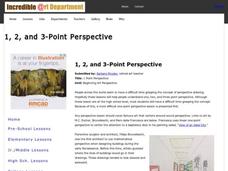
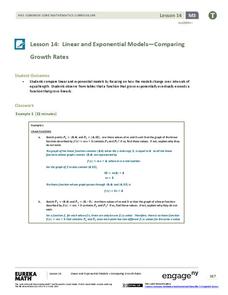
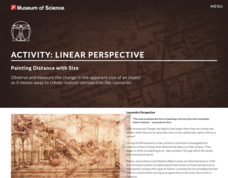



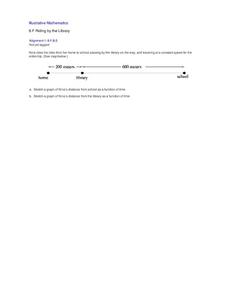
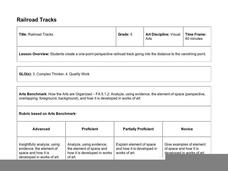




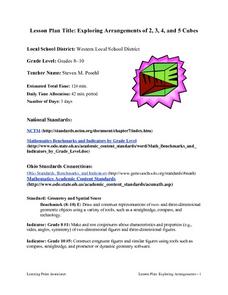

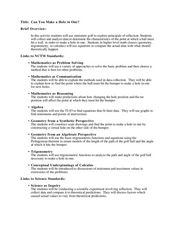



![Arts Now Learning: Perspective Drawing Inspired by n.c. Wyeth [Pdf] Lesson Plan Arts Now Learning: Perspective Drawing Inspired by n.c. Wyeth [Pdf] Lesson Plan](https://d15y2dacu3jp90.cloudfront.net/images/attachment_defaults/resource/large/FPO-knovation.png)